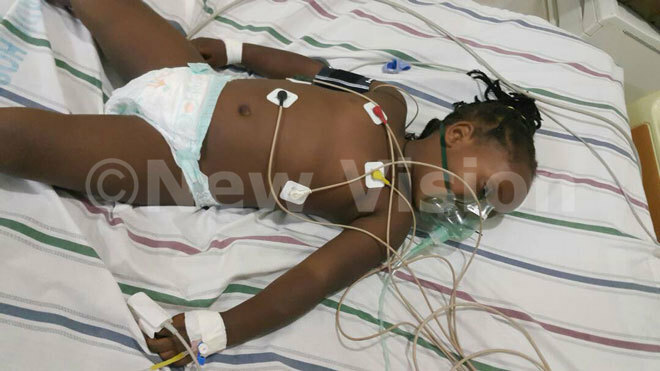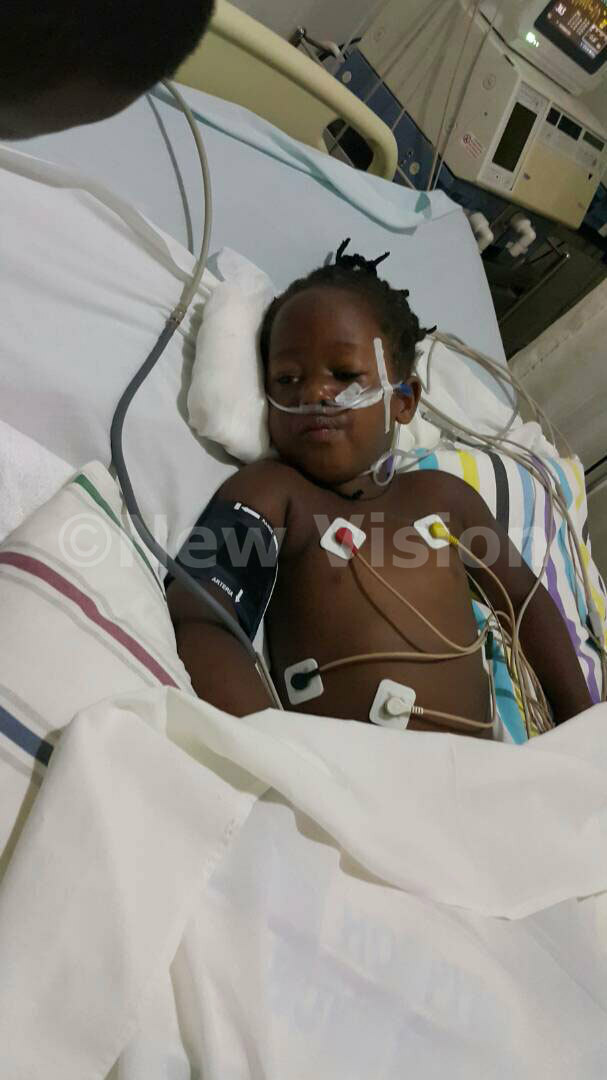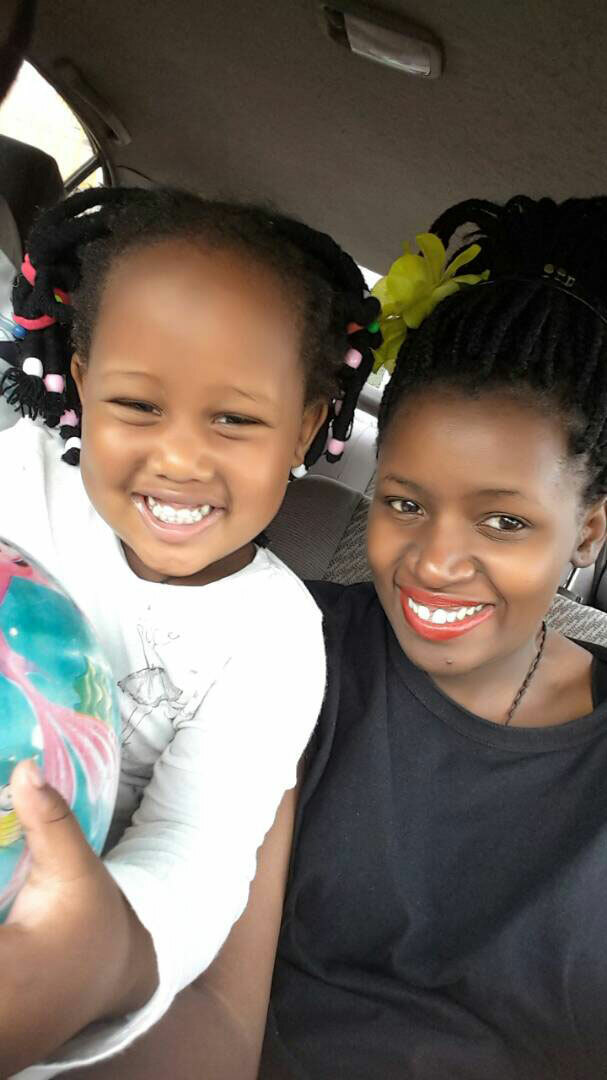How an innocent game left me in tears
I rushed around the compound to look for my baby, but she was nowhere to be found. I ran to the gateman to ask where his girls were. He had no idea.
A mother's worst nightmare is being unable to control the situation when something wrong happens to her child. Dinah Ahimbisibwe shared a harrowing tale with Ronald Mugabe
Dinah Ahimbisibwe Ruvuza, a mother of two, recently encountered a horrible experience that no mother would want to find themselves in. Her almost three years old daughter, Kayla, was left fighting for her life after she was locked up in a car for several hours; suffocating her in the process.
Kayla managed to regain her consciousness after about 10 days on life support, but has now lost almost all her senses and the family is now waiting for their daughter's miraculous healing.

Ahimbisibwe shared her story with Sunday Vision so parents can learn and be more vigilant in protecting their children.
It was Thursday night, at around 3:00am and my six-month-old baby still would not sleep. I started to pray the 3:00am prayer as I waited for her to sleep. At 4:00am, she dosed off and I finally managed to get some sleep.
At 5:00am, my husband's alarm went off and up she was again.
This time, she did not sleep again till 8:00am. My older daughter, Michaela Keeza (almost three years now and we usually call her Kayla) got up jolly as usual calling me so hard that I could not sleep again. I was forced to begin my day with heavy eyes. I made her breakfast and fed her since her appetite was low.
We watched her favourite cartoon together till midday, when I gave her her midmorning snack.
Her playmates (who are the gateman's daughters) came in and since I saw she had company and the maid was watching them, I went with the younger baby to try and get her to sleep so that I could nap.
By 1:00pm, we were both fast asleep. I was awoken by a phone call which I did not pick. I took a shower and dressed up, but I noticed that I was not hearing the girls I left playing in the living room.
At first, I thought Kayla was asleep, but still decided to call the maid and ask where they were. She said: "Nabagulidewo nebagenda kuzanya." (I opened for them and they went to play).

Frantic search
My heart started to beat fast like I knew something was wrong. I rushed out of the house to see where they had gone. It is very unusual for my daughter to play quietly. She will at least be fighting for a toy, laughing out loud or crying.
I rushed around the compound to look for my baby, but she was nowhere to be found. I ran to the gateman's house to ask where his girls were since I had last seen them with mine. He had no idea.
Together we searched and called out the children's names hoping at least one would hear and return. I feared they had been kidnapped. My heart was beating fast and my knees were weak.
As we stood in our compound, out of options; thinking of going to make a Police report, I saw an Ipsum car with tinted windows in the corner of the compound.
It belonged to one of our neighbours and had been parked there for about a month with a mechanical issue.
I saw the head of one of the children popping out from the boot area of the car. I screamed,
"One of the children is here!"
We rushed to open the doors, but they were all locked. I could see my daughter lying in the back seat motionless. I was about to get a stone to break the window when the gateman found the boot open. Two of the children had completely passed out and one slightly conscious.

Kayla and her mother before the incident
The slightly conscious girl managed to tell us a certain boy from the neighbourhood had got them into the car. I rushed through the boot to the back seat where my daughter lay face down. I was screaming as I pulled her out. I called for water and started pouring it all over her. There was no motion. I could hardly feel her breathe.
I knew I had to get her to the nearest clinic. I put her in the back seat of my car, called out to the gateman to bring his children (who were vomiting all over him). I drove off like a mad woman screaming at the top of my voice, "Save my child, Jesus. Save my child."
Seeking medical attention
The first clinic we branched to could handle only the other two children. They advised that I rush my daughter to the nearest hospital because her condition was critical.
I was going fast, but the gateman (who had offered to carry my daughter; leaving his behind for first aid) kept screaming for me to speed up: "Mama Kayla yanguwaaa. Laba amaso gagendaaa!" I drove even faster with double indicators, hooting continuously and passing through the wrong sides of the roundabouts, overtaking all the cars on the road.
We reached Life Link in Kyaliwajjala Wakiso district and medics tried putting her on oxygen, but nothing was changing. Her oxygen level was now at 30%. They realised later that her lungs were full of all kinds of fluids and no oxygen was going in.
I knelt by her bed holding her hand still begging God to save my baby as the doctors struggled to keep her alive. They brought a machine to suck out the fluids from her lungs and then asked me to step out. There are moments I lost hope and started to prepare myself for the worst.
I stood outside the emergency room (ER) pacing up and down; peeping to see if I could read any expression from the doctors' faces. None of them looked hopeful. I could see my little girl shaking so vigorously. About an hour later, a doctor came out to talk to me.
"Please tell me my baby is okay," I said desperately.
She smiled and said: "We hope for the best, keep praying." She said we needed to go to a hospital with a life support machine since they did not have one and that they had called an ambulance to take us to the nearest intensive care unit (ICU).
Soon, the ambulance arrived but we had to wait another 30 minutes because Kayla's condition was too unstable. They needed to get her to a point where she could survive for 20 more minutes; enough time to reach the next hospital. They then took us to Kadic Hospital, Bukoto.
The 15 minutes we took to reach Bukoto is when I realised the importance of letting an ambulance pass by when it is behind you. There are people who intentionally refused to let us pass. I remember a particular woman in her silver mini Pajero who quarrelled that we were trying to bypass her. Eventually, she let us through.
We reached Kadic and my little girl was pushed into the ICU and the door was closed. The next time I saw her, she was hooked to so many wires and tubes. It was a horrible sight. Machines were beeping, but I had no idea what the readings meant.
Whenever I would ask the doctor about her status, they would just say: "Do not stop praying."
Close relatives started to flock in - supportive and trying to assure me that all would be well.
At some point, I found it so hard to pray that I resorted to sending messages to all my friends to pray for us. I was in so much denial that for most of the time I was talking to everyone like there was nothing wrong.
Every one said I was strong, but I just did not believe that my own Kayla was the one lying on that bed fighting for her life. It was hard for me to call her by her name because I seemed to think none of it was happening.
Confirming the worst
For four days, she was in coma, yet the CT scan showed that the brain appeared normal. They decided to do a second scan.
The day we received the results, I read through, but because they were complicated words, I Googled. Then, in panic I rushed to look for a doctor to explain it to me, hoping she would say something different.
Unfortunately, it was true, my little girl had suffered a hypoxic brain damage in the part responsible for vision and movement. There was a possibility of blindness. I cried harder than I remember ever crying. The pain I felt, I would never wish for my worst enemy. My husband, worried, stayed at the hospital with me that night. We sat together at the door of the ICU all night.
Days passed and slowly Kayla started moving her fingers. I learned that with this condition, celebrating even the tiniest change is key. The day she kept her eyes open for 30 minutes, the day she put her tongue out, the day she cried for the first time, the day she moved her whole arm were milestones I cherished.
The doctors started to reduce the amount of oxygen she was consuming and about 10 days later, they took it off completely because she could now breathe on her own. She was staying awake longer now, but we realised she could not see.
Soon, we left the ICU, having been in the care of someone I was told is the best paediatric neurologist. He always sounded hopeful about her condition. We were still not sure she could hear us, but we kept talking to her and playing her favourite cartoons.
Leaving hospital
Weeks later, we were discharged from the hospital. All her medicine was oral and since she was still feeding through a tube, it was easier for us to manage her from home. We would go to the hospital to change the tube and get reviews.
Seeing Kayla like this was as if we had just given birth to a new child. We had to train her from scratch.
There is nothing she could do on her own. Kayla, after the incident cannot sit upright, support her neck, eat, talk or do anything without assistance.
We started physiotherapy in the hope that one day, she will snap out of this and we will have our cheerful playful girl back to normal. I have not met anyone who has experienced this. Most people who talk about children who were locked in cars say they died.
In this short period, I have learnt that ignorance is expensive. If the child who locked the boot door knew how dangerous it was to do so, maybe things would be different.
Low awareness
We received over 150 visitors at the clinic, but more than half of them had never heard of something like this.
Most had no idea how dangerous a car can be, recalling the times they left their children in the car to enter a supermarket. Personally, I had only ever heard of one incident in the US.
It is a painful story to tell, but I kept telling myself that if speaking out could save even one life, it would be worth it. God is our sole protector, but we have to put some effort. Let us educate the maids at home and the gatemen.
Let us be keen and watchful and always know where the children are. You can never be too careful when protecting children. Sometimes when I want to beat myself up for taking a nap and leaving the maid in charge that day, I realise it could have been worse if I had not been too sleepy to go to work.
I never miss going to work at my bridal wear shop. That day was an exception because I had spent most of the previous night awake and decided to stay home.
First aid
Dr Rose Mutumba, a paediatrics ophthalmologist at Mengo Eye Clinic, advises that in such cases where someone is found unconscious, it is important to keep their air ways clear.
"Make sure nothing is blocking the nose and mouth. Oxygen is the most important element in ensuring a person's survival. After this, rush them to the nearest medical facility," she explains.
Chances of recovery
Dr Esther Akullo, a physiotherapist at Pancare Physiotherapy Services says Kayla's situation gives hope of recovery.
"It is possible that she could improve, depending on how much brain damage she suffered," Akullo explains.
Dr Mutumba adds that physiotherapy and regular consultation of specialists will boost the chances of Kayla getting well.
"With neurological issues, time is important for the healing process. Parents have to be patient," she elaborates.
Prevention
Beatrice Balitenda, a parenting counsellor at the Inspiration Centre for Counselling and Parenting Empowerment, states that to avoid such scenarios, every home must have strict house rules and each member should follow them to the letter. Balitenda advises that a house rule of never allowing children to play in the absence of an adult should apply.
"No matter how trusting a parent or maid can be that a child is old enough to play independently, this rule should not be broken.
It can be taxing, but the consequences of not doing it are worse," she explains.
Balitenda emphasises that just like school rules are not debatable, house rules must never be compromised because they form the basis of guarding against home hazards, especially involving children.
AFTERMATH
Stephen Langa, a family counsellor and executive director of Family Life Network, points out that accidents like Kayla's should never be allowed to graduate into a blame game.
"Parents who find themselves in such unfortunate situations should not blame each other. It is important that the father and other family members maintain a strong support system to sail through the challenge," he says.
"The mother too should not blame herself. She should actually thank God she was home and was able to rescue the situation in time. Both parents should work as a team for the good of the child," Langa adds.
Justice for victims
Asked whether such incidents as Kayla's can attract law suits, Mercy Oyeki, a legal expert with Vision Group, said: "Yes one can maintain a suit for wrongful death under the law reform (miscellaneous provision) Act, which allows a person to sue another for causing death."
"Where it can be proved that the victim did not die, but merely suffered injuries under the same circumstances, they would be entitled to damages. It was negligent of the car owner to leave such a car which, although not intended, has caused injuries to another. He is as such strictly liable and can be sued for wrongful death as per S.5 Law Reform (miscellaneous provision) Act," she adds.
Incidents of suffocation in cars
While Kayla was fortunate to survive the incident, several similar cases have ended in deaths of the victims.
Three-year-old Caleb Kamulegeya, a child to Sharuwa Namuguya and Sulaiman Kiwanuka, residents of Kanyanya zone in Ndejje, Wakiso district, was last year on March 14, found dead in a neighbour's car after disappearing on the previous evening.
Then Assistant Superintendent of Police Hassan Musooba, who also doubled as officer in charge of criminal investigations at Katwe Police Station confirmed the child died as a result of suffocation in the car.
"He was not murdered as some people were alleging. When we discovered his body at the scene, in the neighbour's car, he was seated, with his head bent down; holding sandals in his hand and did not have any bruises on his body," Musooba was quoted by the New Vision on March 15, 2016.
On March 1, 2013, a two-and-a-halfyear-old baby boy was found dead in one of the impounded cars at Hoima Police barracks Parking yard. Kelvin Amanya, a son to Merriam Asaba, a tailor and resident of Bujumbura East in Hoima municipality, is said to have left his mother at her sewing machine to go and play with his friends. The mother said she became concerned when her son who had left her at 9:00am did not show up to have lunch.
After a frantic search, Amanya's body was discovered by a detective who was returning from duty at around 5:00pm. He was found in the front seat at the steering wheel with blood flowing from his ears, nose and mouth.
The vehicle's doors were locked and postmortem details revealed he had suffocated.
While many might think this is a local problem, similar cases have been reported in some foreign countries.
The India Times on April 23, 2017, reported that two children died of suffocation after they accidentally locked themselves inside a car at Maheshera village in India. A snack seller came across the vehicle, raised an alarm, prompting other residents to come.
They broke open the car's window pane, pulled out the children and rushed them to hospital, where two were declared dead and the remaining two were admitted into the ICU in a critical condition.
On Friday August 5, 2016, CNN reported that police had arrested a father after the death of his toddler twin daughters who were left in a hot car in western Georgia